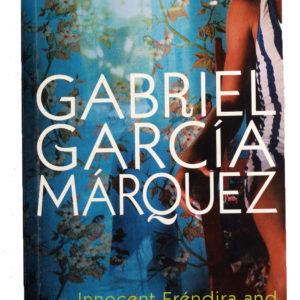Innocent Erendira and Other Stories | Gabriel García Márquez
₨ 478.40
This collection of fiction, representing some of García Márquez’s earlier work, includes eleven short stories and a novella, Innocent Eréndira, in which a young girl who dreams of freedom cannot escape the reach of her vicious and avaricious grandmother.
- Categories: Books, Fiction
- Tags: Gabriel García Márquez, Innocent Erendira and Other Stories, Leftshop, leftshopnepal, radical books, rare readings, red books
“The stories are rich and startling in their matter and confident in their manner….They are–the word cannot be avoided–magical.”–John Updike, The New Yorker
This collection of fiction, representing some of García Márquez’s earlier work, includes eleven short stories and a novella, Innocent Eréndira, in which a young girl who dreams of freedom cannot escape the reach of her vicious and avaricious grandmother.
“García Márquez’s fictional universe has the same staggeringly gratifying density and texture as Proust’s Faubourg Saint-Germain and Joyce’s Dublin….Arguably the best of the Latin Americans.”–Martin Kaplan, The New Republic
“It is the genius of the mature García Márquez that fatalism and possibility somehow coexist, that dreams redeem, that there is laughter even in death.’–John Leonard, New York Times
Related products
with an Introduction,‘The Doctor and the Saint’ by Arundhati Roy
Annihilation of Caste ‘posseses a generic openness to the wounds and decisions of existence which can breach the prisons of the world as no amount of scholarship can’—Biblio
Read a comprehensive interview with Arundhati Roy in Outlook, where she says, ‘Caste is at the heart of the rot in our society. Quite apart from what it has done to the subordinated castes, it has corroded the moral core of the privileged castes. We need to take Ambedkar seriously.’
Purple Hibiscus is set in postcolonial Nigeria, a country beset by political instability and economic difficulties. The central character is Kambili Achike, aged fifteen for much of the period covered by the book, a member of a wealthy family dominated by her devoutly Catholic father, Eugene. Eugene is both a religious zealot and a violent figure in the Achike household, subjecting his wife Beatrice, Kambili herself, and her brother Jaja to beatings and psychological cruelty.
The story is told through Kambili’s eyes and is essentially about the disintegration of her family unit and her struggle to grow to maturity. A key period is the time Kambili and her brother spend at the house of her father’s sister, Ifeoma, and her three children. This household offers a marked contrast to what Kambili and Jaja are used to. It practices a completely different form of Catholicism, making for a happy, liberal place that encourages its members to speak their minds. In this nurturing environment, both Kambili and Jaja become more open and more able to voice their own opinions. While at Aunty Ifeoma’s, Kambili also falls in love with a young priest, Father Amadi, which awakens her sense of her own sexuality.
Purple Hibiscus is an exquisite novel about the emotional turmoil of adolescence, the powerful bonds of family, and the bright promise of freedom.
Ed. Salim Yusufji With an introduction by Bama
This book is an attempt at intimacy with B.R. Ambedkar in his hours away from history and headlines. The aim here is to recover the ephemera that attended Ambedkar’s life and died with him—his pleasure in his library and book-collecting, his vein of gruff humour, the sensation of seeing him in the flesh for the first time, or of stepping out of a summer storm into his house and hearing him at practice on his violin. Here, we have his attendants, admirers and companions speak of Ambedkar’s love of the sherwani, kurta, lungi, dhoti, and even his sudden paean to elasticated underpants. We meet Ambedkar the lover of dogs and outsize fountain pens, proponent of sex education and contraception, anti-prohibitionist teetotaler and occasional cook.
The fragments that make up this volume enable the recovery of his many facets—a rewarding biographical quest.
‘Editors K. Satyanarayana and Susie Tharu have drawn from their previous experience editing anthologies of Dalit writing from south India to collate poetry, essays, memoir and fiction into an immersive experience of Dalit literature as both aesthetic and socio-political identity.’— LiveMint
Read an excerpt published in the Hindustan Times.











Reviews
There are no reviews yet.